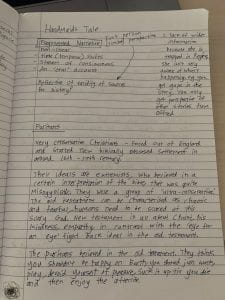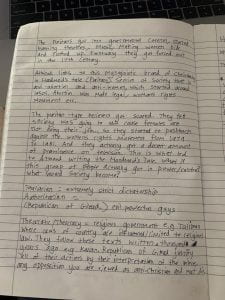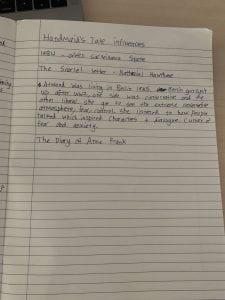Chapter 8 – the tragedy
George goes to kill Gatsby, believing he was having an affair with his wife, as well as to seek revenge for the person that killed his wife in a car accident. (It was Gatsby’s car that killed Myrtle)
“Savage, frightening dreams”
Three major deaths: Myrtle, Gatsby and Wilson. Like Greek Tragedy, all the deaths occur off stage. Nick is the ideal person to narrate these off-stage deaths.
“A thin red circle in the water” Gatsby’s blood flows into the pool, making the shape of a circle. This suggests the story goes full circle? Significance of pool – baptism?
“Holocaust” did not share same connotations as it does today, yet still remains a tragedy. It is not a tragedy of the Jazz Age. It is a tragedy of missed communication, corruption, unrealistic dreams, ego/self belief? Small scale tragedy – everybody moves on. But it stays in the memory of Nick (and the readers) forever.
Chapter 9
https://www.massolit.io/courses/fitzgerald-the-great-gatsby/chapter-9
Key ideas:
Two years in the future (retrospective – impact on story?)
Nick quotes the death of Wilson as being “a man deranged by grief” – simplifies the true motivations. It’s Nick’s duty to tell the tale, that’s why he wrote this novel. But has he reported it honestly? Not really.
Daisy, Tom, and all the other characters disappeared in order to preserve their reputation, only concerned about themselves.
Nick talking about Tom and Daisy “they smashed up things and creatures and then retreated back into their money or their vast carelessness” this sums up the kind of society Fitzgerald represented in the Great Gatsby. They all didn’t care.
This brings up the idea of responsibility. It seems as if these people did not have any responsibilities. Myrtle, Wilson, and Gatsby died as a result. Life wasn’t sacrosanct, it was unimportant, meaningless, lost.
This makes Nick’s job of telling a meaningful, truthful story harder.
“One of the taxi drivers in the village never took a fare past the entrance gate without stopping for a minute and pointing inside”. After his death, Gatsby is now the object of stories and rumours. Nick wonders if the taxi driver has his own story of the event, but shortly after refuses to consider it: “I didn’t want to hear it and I avoided him when I got off the train”
This suggests that Nick doesn’t want to hear any other version of the story except the version he made up.
We are also getting introduced to the idea that there could be multiple angles to this story
“One night I did hear a material car there… But I didn’t investigate” – he hears the car, he sees the lights, but he doesn’t investigate. Contradiction: He’s narrating, he’s not telling. “Sold his car to the grocer” is meaningless.
“Huge incoherent, failure of a house” summaries Gatsby – the house, the place, represents who he aspires to be
“On the white steps an obscene word, scrawled by some boy with a piece of brick, stood out clearly in the moonlight, and I erased it, drawing my show raspingly along the stone”
White: purity
What is the obscene word? Why tell us if it’s just going to be erased? What is the purpose of it?
Supposition of ‘some boy’ vague, generalised description
You can’t see it fully but you can see that it is there. This sums up the character of Nick Carraway and how he tells the story, highlighting something but then taking it away (unreliable narrator)
Towards the end of the chapter:
“Inessential houses”
“Gatsby believed in the green light, the orgastic future that year by year recedes before us” The green light means go, green springs of the future, it has many positive connotations. But here the colour green is questioned.
“It eluded us then” – the whole thing is an elusion. Everything that Gatsby and Nick wanted.
“And one fine morning – “ America still believes it can be something in the future.
This novel suggests that the famous American dream is fake and corrupted, but at the same time leads America into some kind of future.
Significance of symbolic patterning?
Retains the idea of the American dream







